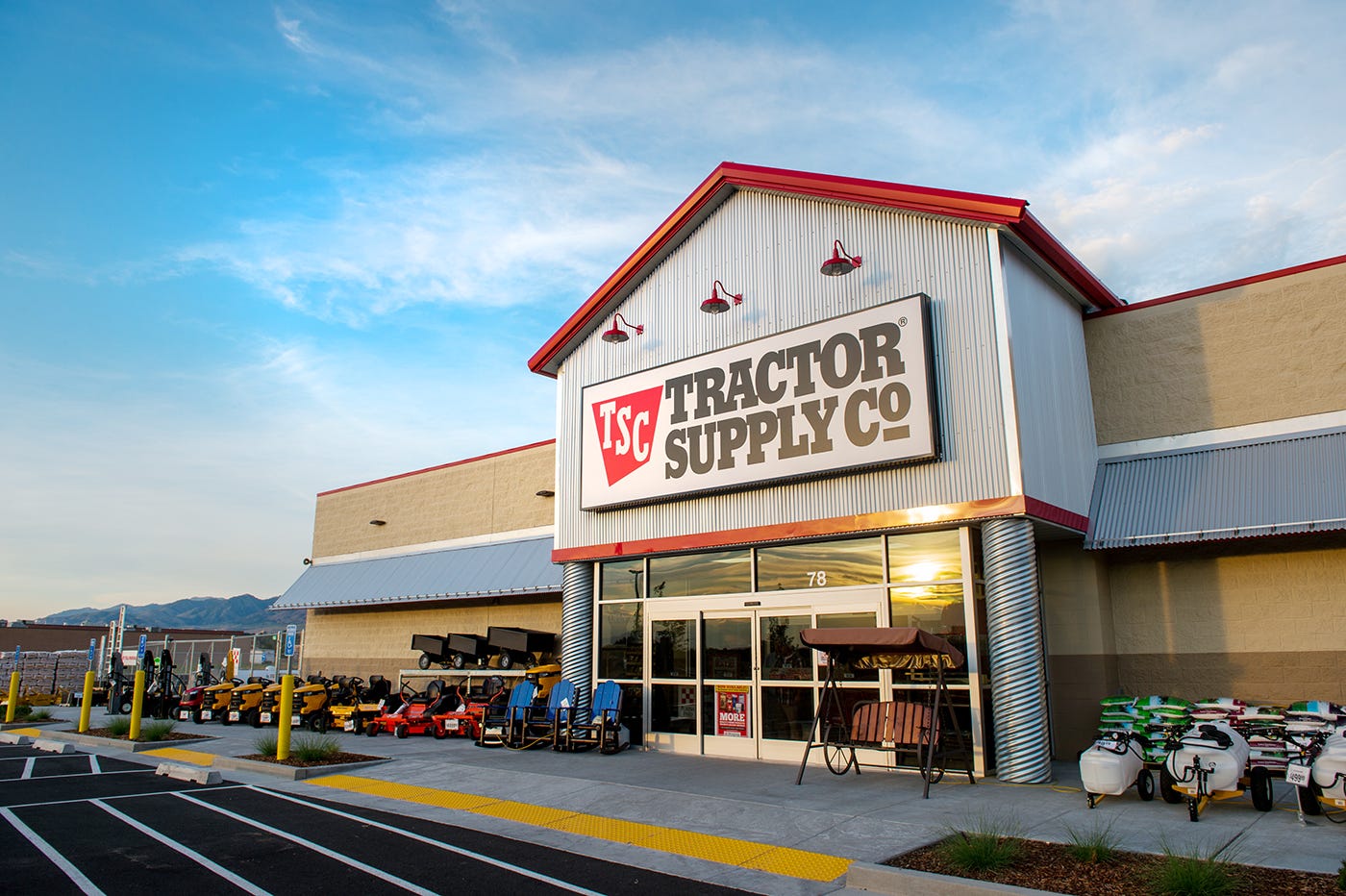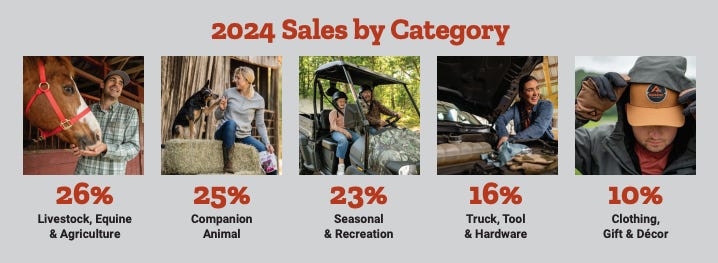Flyover Stock: Tractor Supply (TSCO)
Out where dirt turns to gold
“The first conversation I had with Greg [Sandfort] was about culture. The first time I was on the phone with Joe [Scarlett], it was about culture. The first time I talked to Jim [Wright] on the phone, it was about culture. The weight I feel the most is continuing that culture. … I often get asked, 'what keeps me you at night?' Not having our growth outpace our culture.”
- Tractor Supply CEO Hal Lawton on his first meetings with previous Tractor Supply CEOs
One of my mentors at Morningstar used to say that there’s no clearer sign of an economic moat than an anti-trust lawsuit.
Now, anti-trust and consumer retail usually don’t mix, so I was surprised when the U.S. Federal Trade Commission (FTC) investigated Tractor Supply’s 2021 acquisition of competitor Orscheln Farm and Home.
Normally, if one retailer is doing something well, there’s little stopping competition from quickly replicating it and eliminating the temporary competitive advantage. E-commerce competition has made it even harder for many retailers to differentiate themselves. Why did the FTC see something concerning here?
At its core, the FTC raised concerns that Tractor Supply had an unfair advantages in the brick-and-mortar farm store space. It ultimately led to Tractor Supply selling off some of the acquired Orscheln locations.
The FTC’s complaint is unintentionally one of the finest moat write-ups I’ve come across. You can read the full complaint here, but here’s the most eye-opening part.
“Online retailers are not reasonable substitutes for brick-and-mortar farm stores. The brick-and-mortar shopping environment at farm stores provides their customers the ability to touch and feel products and provides in-person access to knowledgeable sales staff to learn about products best suited for their rural lifestyle needs…Additionally, many products sold at farm stores are not conducive to selling online, as they are large and heavy, and therefore impractical or expensive to ship.”
We’ll dig into Tractor Supply’s moat in a moment, but I wanted to set the scene early that, even though it’s selling items to hobby farmers and pet owners, this is a retail concept that can’t easily be replicated. In fact, the likes of Wal-Mart and Home Depot have tried and failed.
I came across Tractor Supply early in my career during the financial crisis. Back then, I was working for a Motley Fool newsletter and screening for cheap quality companies amid the market volatility.
I tried different quality screen variations and this company called Tractor Supply kept popping up on each one.
Based on the name, I assumed the company dealt with Tractor equipment (which it still does to a tiny degree), which didn’t interest me, but once I saw it was a retailer, I was intrigued. (Companies with funny or non-obvious names are usually a sign of a Flyover Stock.)
At the time, I lived near Washington, DC and the closest Tractor Supply location was about 40 miles away in Maryland. Tractor Supply is still strategically situated in exurban/rural locations and it was a long drive given typical DC traffic.

As I walked around the store, I didn’t get it. As an urbanite, the products struck me as bizarre. Bulk sow and pig feed? Electrified fence chargers? Clearly others found Tractor Supply relevant, though, so further investigation was needed.
In March 2009, the stock was dirt cheap - 10x P/E! - as the chart below illustrates. I was prepared to recommend the stock for the newsletter I was working on with a publish date of March 10, 2009 - the day the market started to recover.

On that day, Tractor Supply jumped 9%. I held off on the recommendation. The market sell-off in the previous 18 months taught me to wait for a lower price. It was the wrong lesson to learn.
Over then next 10 days, Tractor Supply gained another 16%. It never looked back, but I stayed anchored into the March 10 price hoping it would come back. From March 10, 2009 to April 22, 2025, Tractor Supply’s total return was 3,750%.
Whoops.
It was an expensive but important lesson to learn - when something looks cheap and you’ve done the work, don’t hope it will get cheaper. Just buy it. If your thesis is correct, you’ll do just fine - even if someone else was able to buy at a lower price.
Tractor Supply is a member of the Flyover Stocks Hall of Fame as it provides a case study in how companies off Wall Street’s beaten path can deliver market-beating returns.
Let’s take a closer look at how they did it and what the future might hold for the company.
Key Data
Headquarters: Brentwood, Tennessee
Market cap: $26.8 billion
2024 Revenue: $14.9 billion
P/E (ntm): 23.3x
Dividend yield: 1.8%
Mission: “Work hard, have fun, make money.”
Data as of April 22, 2025
Business overview
For the uninitiated, Tractor Supply stores may leave you feeling a bit confused, as I was initially. The inventory on the shelves isn’t things you typically see at other retailers, at least not all in the same place. There is some overlap between retailers - tools can be found at Home Depot and Lowe’s, too, and outdoor clothing can be found at specialty stores. But nothing that completely matches Tractor Supply
What differentiates Tractor Supply is three things:
They’re not located in urban centers or densely-populated suburbs where retailers naturally want to be to generate foot traffic.
They have a specific customer demographic - the hobby farmer. Someone who doesn’t farm for a living, but has over an acre of property and some animals.
A focus on animal products - as we’ll discuss in a moment, this is not easy to replicate for other major retailers.




